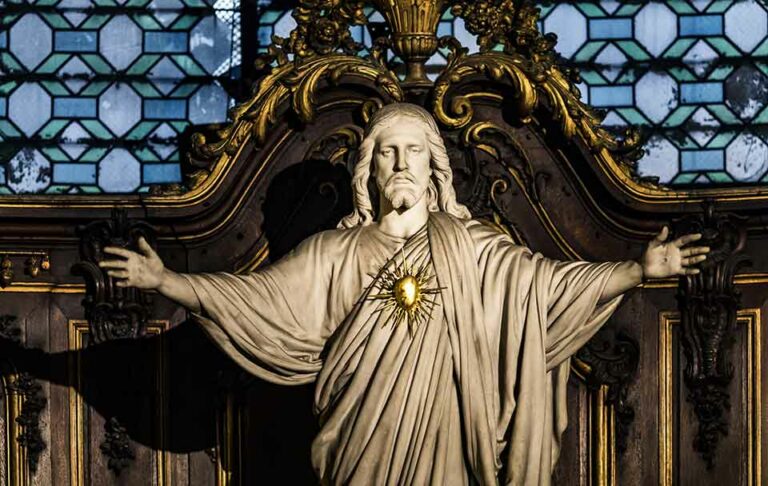“Styles” of Spiritual Direction with Insights of Human Sciences
The Lord desires an intimate, personal relationship with each of us. He never stops calling us into that deep relationship, and as we learn to attune our hearts to the voice of the Lord, we deepen our union with him. “God never ceases to draw man to himself” (CCC 27)
Spiritual direction is a great gift to this deepening relationship with the Lord. The Catechism describes spiritual direction in 2690 where it notes that the Holy Spirit gives some of the faithful the “gifts of wisdom, faith, and discernment for the sake of the common good which is prayer” In other words spiritual direction serves prayer, which is not simply an activity we do as believers, but the very life we live as disciples of Jesus Christ. Spiritual direction is thus a servant of the Christian life.
The relationship between the spiritual director and directee is a human relationship aimed at engaging the directee in his or her discipleship and responsiveness to God. It’s whole purpose is to serve, uphold, and strengthen the directee’s following of Christ.
Going deeper
The ongoing and progressive opening of our lives to God is the whole enterprise of spiritual direction. As a directee enters more into deep spiritual direction, there is a growing awareness of God’s presence and “voice” in life, which stirs the desire to follow the Lord, live in his will and love. It generates that deep desire to hear, hold on to, and put into life the will, the action, the grace of the Lord: “Speak Lord, your servant is listening” (1 Sam. 3:10).
Because spiritual direction serves Christian prayer (which is Christian life oriented to God), the way of spiritual directions mirrors the way of prayer. Prayer begins in the purgative stage (because our following begins there “Repent and believe in the Gospel”.) This may start with vocal prayers that become progressively more interior and meditative, fostering one’s friendship with God. The disciple realizes his or her need to repent and virtues begin to take root. Spiritual accompaniment at this stage probably can look like the “moral motivational model” in which the director encourages the directee to allow God to purify his or her heart and to be freed from a life of sin.
As the Christian begins to grow in deeper intimacy with the Lord, prayer becomes more discursive meditation, often involving sensible consolation. Spiritual accompaniment at this stage looks like a “catechetical model” in which the directee goes beyond the initial conversion to a deeper receptivity to the teachings and morals of the Christian faith.
This is followed by a deepening affective mediation. This movement in prayer allows the disciple to grow deeper in love and attachment to the Lord, gaining insights into the mysteries of faith. Here, the virtues become more solidly rooted, resulting in greater charity, more profound humility, and faithful obedience. This growing intimacy most corresponds to the illuminative way.
Then at a certain point, we let go and let God take over, abandoning ourselves to his purification. Acquired contemplation and then infused contemplation further move the disciple to just “be” in prayer. This growing receptivity to ongoing union with God opens the disciple up to the grace of heroic virtues: highest charity, perfect humility, great faith, abandonment and unalterable patience. This movement toward the unitive stage is best accompanied by true and deep spiritual direction which itself is described as “comtemplative-evocative”..
In a sense spiritual accompaniment in the general sense should also be seeking to yield to actual spiritual direction. The spiritual reality should be moving toward the contemplative-evocative model as this is where the life of prayer is meant to go, and where the Christian life is meant to go.
In this sense, we can ask at what point can real spiritual direction begin. A person has to possess sufficient human and spiritual maturity. Human maturity depends in part on age. Spiritual maturity depends upon discipleship. (In this vein, some spiritual writers consider that you cannot really begin spiritual direction until some has first live a “spiritual exercises” retreat or something similar).
In addition, when we say “contemplative-evocative” is not passive, as the name might suggest. Rather, it is profoundly active, with an activity profoundly configured by a deep and lively sense of faith in the Lord’s presence, hope in his grace active in my life, and love that moves me to seek Him out and “offer” myself to Him. This is the spiritual direction of deeply contemplative and active souls. It is the way of contemplation that is not inactive, and mission that is not activism.
The contemplative-evocative model
Because becoming ever more contemplative-evocative is the goal, it is important to understand what spiritual direction looks like at this point. Here, the director should not occupy too much space or try to problem-solve in spiritual direction. It requires a lot of deep self-awareness on the part of the spiritual director to ensure that he or she does not fill the space that belongs only to the Lord. It involves being aware of my boundaries and identity, what might tend to draw me out of that identity (triggers, attachments, possessiveness, countertransference…)
The contemplative-evocative model is to contemplate, that is, to observe and listen intently within the context of a dialogue. It is also to evoke, to call up, bring, or recall movements of the Holy Spirit to the conscious mind. It is in reality the way of true theology, which seeks to gives expression to the mystery of God (in this case, in human life).
In the contemplative-evocative model, spiritual direction looks like deep listening to the directee, and exploring what is heard.
The director’s object of listening in spiritual direction is to listen to the person. It is also a listening, into the person, to understand what the heart is saying (CCC 2952). It is also to listen to God through or within the person.
How the human sciences help
St. Thomas states that grace informs nature. In our words, God’s grace (his action) “enters into” and transforms the pathways of our humanity and human experience. In this sense, the human sciences can help us better understand the pathways of grace, and gain indirect insight into the nature of grace which our humanity was created for and through which we share God’s very nature. In the case of spiritual direction, this interplay of grace and nature can yield important insights into why being “contemplative/evocative” as a spiritual director can become a graced experience for the directee.
The human person was created for relationship and communion with God and others. We are meant to become gifts, be received as gifts, and receive others. Our spiritual flourishing depends on this.
The human sciences has discovered the vital importance of what is called empathy and its power for human healing and flourishing. Many psychological/moral/spiritual wounds are received in unhealthy relationships and they are also healed in proper relationships.
Empathy is expressed and communicated through the listening skills or human relating skills, which in a Christian framework are virtues and an important aspect of “human formation”. These listening skills are at the core of “evoking” and “contemplating”.
In exploring what a directee shares, the director reflects back to the person what he or she hears, helping the directee to hear his or her own experience. This becomes an important pathway to self-awareness, and self-knowledge, and ultimately the basis of deep examening prayer. By expanding on what the directee shares and asking expanding, open-ended questions, the directee is able to explore the breadth of their interiority and their inner experience of life, in which Providence is at work. Additionally, validating and giving a person permission to be where they are in the moment helps build a sense of trust between the director and directee. It gives the person space to be vulnerable and enter more deeply into experiences to discover the Lord’s voice. Deepening then helps the directee penetrate into their interiority… this is where true discernment occurs.
In short, empathy exercised through the listening skills are essential in the contemplative-evocative model of spiritual direction because theologically, they direct a person back to the arena of their own interiority where the Lord seeks to encounter them. (cfr Luke 15:17, CCC 2562)
Deep listening helps a person feel safe in his or her own skin as well as not to over spiritualize the spiritual life. It is also the basis of a safe, trusting, and deepening relationship. The directee has to be free to be able to bring all things up. It can also help normalize a new and possibly trying situation by having the space to talk it out and be genuinely heard. Listening helps a person come back to his or her self and access the place within the heart where the Lord speaks.
Are you called to accompany others spiritually as a spiritual director? Learn more about the Spiritual Direction Certificate Program at Divine Mercy University.







